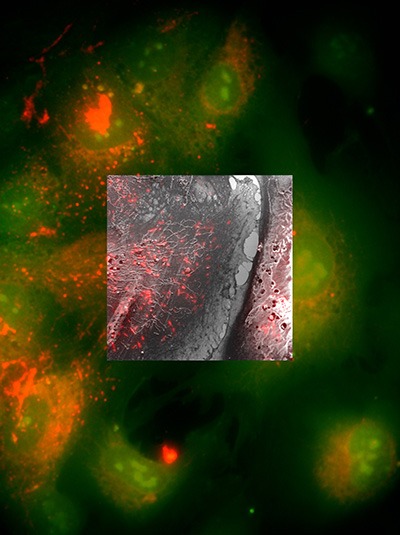AXT, Australia’s leading supplier of high technology scientific equipment is pleased to announce that they have signed an exclusive distribution agreement with Delmic, a Dutch company specialising in unique fluorescent/SEM (SECOM) and cathodoluminescent/SEM (SPARC) correlative microscopy technology.

The Delmic SECOM system is suited to life science applications and is an add-on system for scanning electron microscopes (SEMs). It effectively integrates a fluorescent microscope into an SEM and allows the user to simultaneously image a specimen using both systems. This yields more useful information, at a much faster rate. One of the major benefits of the SECOM correlative microscopy technique is that the operator can overlay images from both techniques. While fluorescence microscopy is popular in the life science arena and due to its ability to reveal functional protein information, the technique lacks the ability to show structural detail. Adding SEM capabilities overcomes this limitation, while the correlative/simultaneous nature enables the researcher to look at the identical cell at the same time. SEMs also introduce the possibility of analysis using other complimentary techniques such as BSD, SE and EDX.
Sander den Hoedt, CEO of Delmic explained that, “prior to SECOM, there were no off-the-shelf systems that integrated both fluorescence and scanning electron microscopes. This meant that if a researcher wanted to image their specimen using both systems to try and reveal complementary information, it was a very tedious and manual process, and trying to image the same region or cell with both techniques was laborious at best. Furthermore, with many specimens being biological, they have the propensity to change during the transition from one microscopy technique to the other. SECOM overcomes these problems, as well as eliminating the possibility of contamination and opens the door to new possibilities.”
Richard Trett, AXT Managing Director commented, “the Delmic SECOM system dovetails nicely with our range of TESCAN scanning electron microscopes and broadens their appeal to the life science sector. We have identified this as a growth area for our business and recently bolstered our sales team with the appointment of Desley Pitcher as National Life Science Sales Manager. I feel certain that this new product will help us grow in life science sector.”
Similar to the SECOM system, the SPARC system provides analytical CL capabilities to SEMs and is aimed at the nanophotonics market. It is one of very few systems that can provide a full spectrum analysis of the resultant emission to determine the CL intensity.
Sander was also excited about the possibilities in the Australian market and said that, “while our company is quite young, we have several systems currently in use around the world. We look forward to rapidly expanding our user base via distribution agreements with companies like AXT and we look forward to installing systems in Australia and New Zealand in the near future.”
SECOM and SPARC systems are available as an add-on for SEMs. They can be easily installed and removed as required. The systems feature a user-friendly interface that can control both the microscope and SEM with the ease of an optical microscope.
